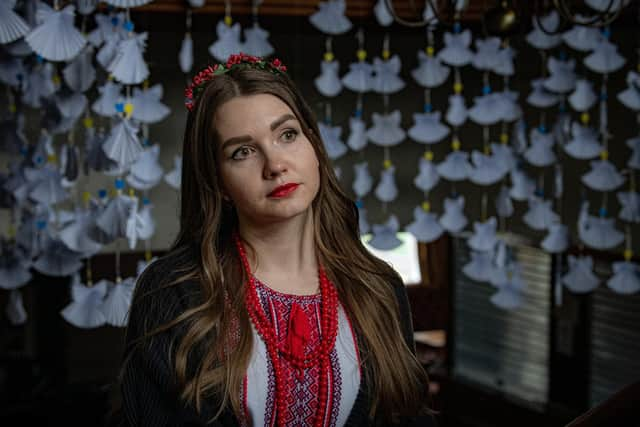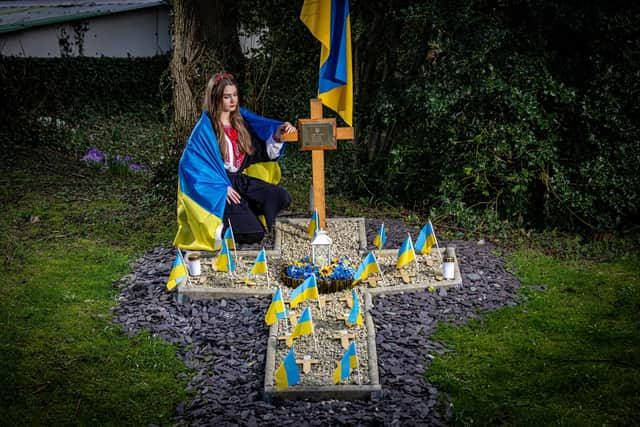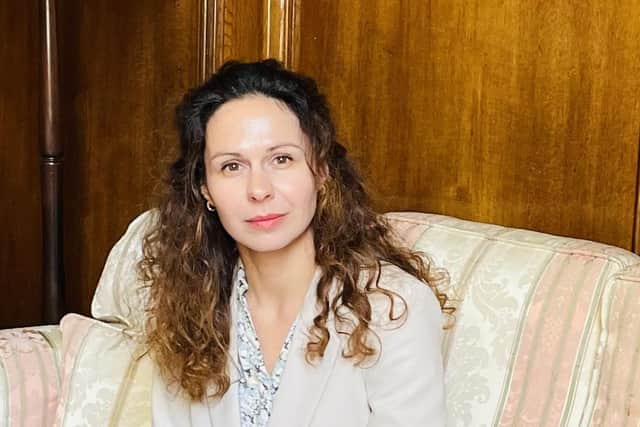Ukraine War: For families settled in Yorkshire life will never be the same after fleeing the bombs of their beloved homeland
Here is a mother, who fled in the first hours of war, to bring her daughter to safety in Yorkshire. In every face from the news she sees her loved ones’ reflected in horror.
A musician, whose song strains to portray the beauty of home and the bitter call of her piercing sorrow. A restless son, torn from his family and forbidden, for now, to return.
Advertisement
Hide AdAdvertisement
Hide AdToday marks two years since the invasion of Ukraine, when so many lives were thrown into turmoil. Wreaths are to be laid. Songs sung, for the fallen.


For communities across Yorkshire, so far from home, the war rages on relentless. There is a plea still, to see, to hear; to not close hearts and minds to the pain.
“That feeling, two years ago, was of shock,” said Ewhen Chymera. “It was so close to home. Now, the war does continue. Thousands are killed every day.
“Our homeland means so much to us,” he added. “We can’t have a peace that gives up. Without Western support, Putin wins. What that means for the rest of us is really quite frightening.”
Advertisement
Hide AdAdvertisement
Hide AdMusician Viktoriia Prysiazhna fled Odessa 18 months ago. Every day, she calls her father on the phone. At 58, he is of fighting age and is forbidden from leaving Ukraine. It hurts, she said in softly accented English, to watch the news.


“It is not a big country,” she said. “There are few people. And this really is a big evil.”
Ms Prysiazhna, 30, arrived in Bradford in June 2022. It took months for her to make the move, fearful of what it might mean. Back home though, it wasn’t safe to sleep in her flat. That first morning, it was to the boom of war that she woke.
“I could hear a loud sound, of the bombs,” she said. “I thought ‘it’s started’. The war. It was really difficult because I didn’t know - what could I do?”
Advertisement
Hide AdAdvertisement
Hide AdMs Prysiazhna couldn’t speak a word of English when she came to Yorkshire. Incredible sponsors, under Homes for Ukraine, helped. She went to Bradford College, for language lessons. Now she teaches music, she plays the piano in Saltaire. She adores the Alhambra.


“I donate for the soldiers,” she said. “I always miss it. I hope we can go back.
“This is the 21st century, why is there war? More people die. More men die. It’s global politics. I believe more support is needed.”
The Bradford Ukrainian Club is a home from home for communities across the district. There are perhaps 1,000 refugees now settled in West Yorkshire alone.
Advertisement
Hide AdAdvertisement
Hide AdMass is to be held this morning at St Joseph’s Catholic Church, with the Association of Ukrainians in Bradford. Some will then travel to Leeds to a service at St Anne’s Cathedral.
Ewhen Chymera is a committee member of the charity in Bradford, mobilising humanitarian aid, language lessons, funds and donations. Today there is a ‘help yourself’ shop, with clothes and toiletries. Self-defence classes, a beer festival. Walks, in the Yorkshire Dales.
The community here was first established in the wake of the Second World War. All four of his own grandparents were resettled from German slave labour camps.
The goal now, he said, is a daily sense of normality. And help with the basics: “People come with a backpack or a suitcase - and what do you put in a suitcase when you’re running?”
Advertisement
Hide AdAdvertisement
Hide AdOf the refugees arriving in Yorkshire, most are women and children. Men of fighting age are forbidden from leaving Ukraine. A simple text home, then, becomes so much more. A tentative ‘how are you’, if unanswered, becomes terrifying.
“We live in 2024. If a bomb drops on a street in Ukraine, I can know about it in seconds on social media,” said Mr Chymera. “That doesn’t help families, not knowing if their loved ones are safe.
“We always remember those words from 1945: Never again, to see war in Europe. Those words are pretty hollow.
“Today, we are marking the date, and it is also saying ‘thank you’ to those who have laid down their lives in this fight.”
Advertisement
Hide AdAdvertisement
Hide AdFather Viacheslav Semeniuk is in a difficult position. He left Ukraine nine years ago, and now he cannot return. At 41, he is of fighting age. It would mean leaving his family to the streets, he said. These ties bind him here.
Instead, through charity work, he helped send a pick up truck this week to the Polish border. It will deliver supplies to soldiers and the wounded, paid for by donations in Leeds.
“We have no choice,” he said. “It’s our duty. This is my duty, to do what I can. If I can’t go and fight I will be fighting in other ways.”
Mr Semeniuk works with the Leeds Ukrainian Community Centre. They rally, with registered charity events, selling food or souvenirs. A Christmas celebration. There are also corporate sponsors, such as Bundobust’s Marko Husak and Otley charities run by Nigel Francis.
It’s coordinating efforts. Knocking on doors.
Advertisement
Hide AdAdvertisement
Hide Ad“My daughter is really missing to see her grandparents,” he said. “It’s almost three years already.
“My hope is that the war will be over. Looking at the situation, I don’t see any positive signs.
“People are starting to forget about the war. They are tired of donating. It’s very hard to fundraise at the moment.
“We need to remember. And not just people, but Governments.”
Advertisement
Hide AdAdvertisement
Hide AdToday marks two years since the outbreak of war, and communities across Yorkshire have gathered through this week in many different ways.
Today there is to be a vigil for peace at York Minster, with York City of Sanctuary, and a charity concert at Hull Minster. On Monday, there was a documentary exhibition in the House of Commons. On Thursday, a screening of 20 Days in Mariupol at Hull’s Guildhall.
To Anastasiia Manina, today’s date is not an anniversary. That would be to mark the end of war, she said, and this is far from over.
The playwright, with her then five-year-old daughter, was the first refugee to arrive in Hull, on March 2, 2022. They fled their home in Kharkiv within the first hour of waking on that first day of war, as the first wave of bombs fell on their homeland.
Advertisement
Hide AdAdvertisement
Hide Ad“I saw from my window what was going on,” she said. “I had to save her.”
Ms Manina had grabbed two backpacks. Documents, toys, children’s clothes. An anecdote today among refugees, for those that fled that first day, is that almost all forgot their socks and underwear in that first flurry of panic.
Mother and daughter travelled through Ukraine, to the Moldovan border. Then arriving at Luton Airport. Seeking assistance from British border officers.
“It’s not building a home,” said Ms Manina, who works in marketing. “It’s building a life. It is hard. I try to find a symbol. It’s like losing an arm or a leg. You behave as if it’s still there.
Advertisement
Hide AdAdvertisement
Hide Ad“That is probably what happened to me. I remember the first month. I behaved like I was still in Ukraine. I was still the same. I thought I was the same. I was not. I will never be.”
Today, her now seven-year-old daughter’s dream is a simple one; to see her daddy again. And to Ms Manina, when she watches the news, she sees her family, her loved ones, in the drawn out faces that appear on the screen.
“It’s exhausting,” she said. “I can’t not watch the news. I see in the people, who die and who suffer, myself and my family. It hurts a lot at times.
“My hope is for victory,” she added. “It’s not about stopping the war. This is a fight for democracy. It won’t stop, I know how this grows. Only victory can stop this for Ukraine.”